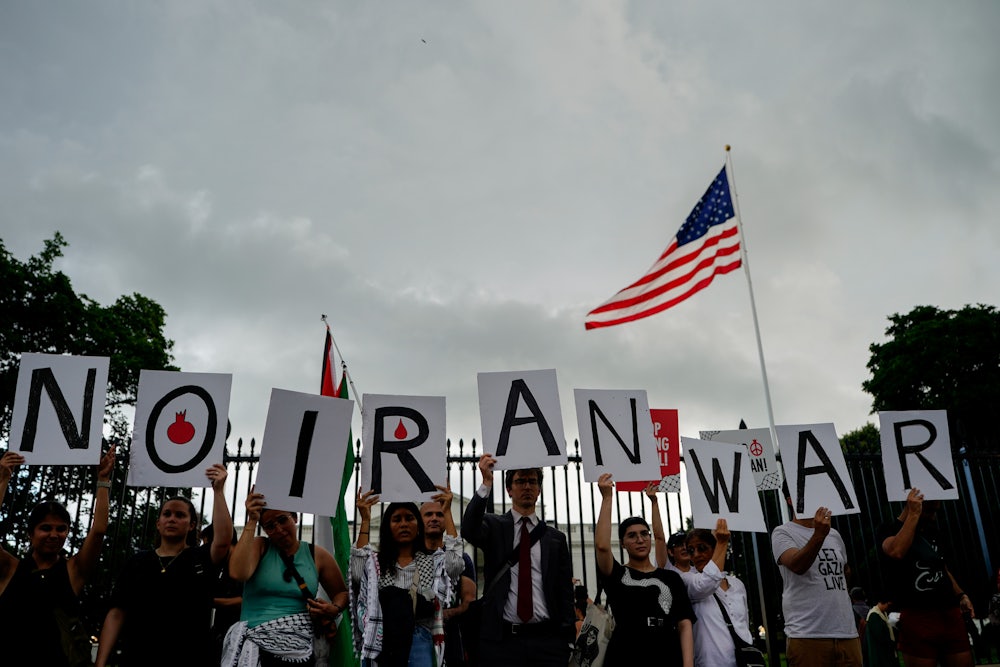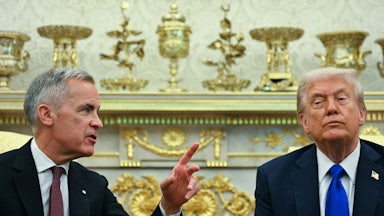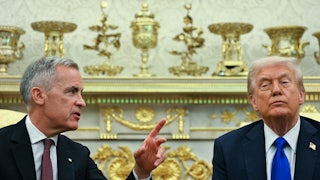When I began writing this, my parents were in Iran. By the time you read this, they will have made it safely across the border. Millions of other Iranians will not have this luxury, and millions more in the diaspora anxiously wait to see what will come of Trump’s unilateral move to bring the United States into Israel’s bombing campaign. We’re calling our relatives and loved ones in between internet outages, wondering what cities will next face aerial bombardment, praying for a return to diplomacy . But if you look to the Western press, you’ll see politicians, government spokespeople, and commentators insist that the Iranians are happy, enthusiastic, supportive of Israel’s attack. The Iranians they claim to speak for aren’t filled with joy. They’re bracing themselves for the worst.
When chess came westward by way of the Persian game shatranj, many rules changed, but others remained constant. Even in its earliest iteration, the pawn was the only piece that was unable to move backward. Growing up as an Iranian American, you are a constant pawn in someone else’s propaganda. Right now, our leaders act like the path to war with Iran is irreversible, and they are using us as pawns to sell it. We are beset by ideologues who demonize our people while cynically calling for their freedom. They mock dead Palestinian children while claiming to have the freedom of my people at heart. They decry the suppression of Iranian protests while cheering violence against protesters here. They chastise Iranian theocracy while scheming for theocratic Christian nationalism here. Their ideologies revolve around grievance against feminists, queer and trans people here, but they insist they really, truly care about the rights of Iranian women and LGBTQ Iranians.
The Persian poet Sa’adi wrote, “Empty words disgrace the one who speaks them, like serving a walnut shell without the nut.” You do not need to know Persian poetry to see that most rhetoric around Iranians is dishonest. The majority of Iranians in the diaspora do not support war, especially younger diaspora Iranians whose lives have been shaped by the perpetual war on terror.
Yet the most unhinged and extreme pro-war voices in the diaspora are elevated over us to influence non-Iranians on what our attitudes are. They would have you believe there is a secret wellspring of support among Iranians for Israel’s bombing and potential American military involvement; that Iranians are the only people in the world who believe freedom comes in the form of foreign bombs. Their bellicose rhetoric wins State Department funding at the price of innocent Iranian blood, a price they can usually afford because they no longer have family or loved ones remaining in Iran, a privilege most Iranians in the diaspora don’t have.
The cheerleaders of war would have you believe America’s noble intentions are to free Iranians from their regime. W.E.B. DuBois challenged a similar rationale regarding the mythic legacy of Robert E. Lee and the “Lost Cause.” “People do not go to war for abstract theories of government,” he wrote. “They fight for property and privilege.” The American government does not go to war to “free” people but to protect its own material geostrategic interests.
But a war with Iran is not even in our interests—it’s exclusively in the interests of an Israeli state that initiated an attack to blow up the diplomatic effort toward a nuclear rapprochement with Iran. Netanyahu’s capacity to remain in power depends on Iran serving as an eternal foil; his calculus was that if Israel started a war it could not finish, it would force America’s hand. At no point do the rights, freedoms, homes, or lives of Iranians enter the equation. We are the background actors; fodder for Israeli propaganda to justify destructive wars and mass killing that they insist are only targeting the Iranian government. In the early stages of Israel’s blitzkrieg of Gaza and Lebanon, similar rhetoric was used to justify Israeli bombing as “liberating” the people of Hamas and Hezbollah, respectively. When this narrative collapses under the weight of dead civilians, these altruistic motivations disappear. These are wars of submission.
You cannot help people by bombing, attacking, and starving them. But in the Beltway foreign policy establishment, Iran remains the final frontier of humanitarian intervention—the best-case scenario where it will not spectacularly backfire into a destructive quagmire. The supposedly serious geopolitical “experts” live in a perverse fantasyland where other people like being bombed, need their homes destroyed, and view the deaths of their neighbors and loved ones killed as “liberating.” They say Iranians will look at their world in ruins and cry, “Freedom!” But the problem is not that these defective elites actually believe this, it’s that they’re incentivized to ignore the interests of Iranians and Americans alike. Their salaries depend on telling war hawks what they want to hear: Don’t worry! This time, this war will work.
This dogma is rooted in delusion, like how pre-Revolution Iran was some idyllic state with Western values. In reality, Pahlavi Iran was an authoritarian monarchy facing constant discontent, characterized by mass poverty and widespread illiteracy, where political enemies were routinely tortured and killed. You can’t tell from the vintage photos of veil-less women in bell bottoms that the Shah’s Iran was a puppet state, directing all state capacity to being a gas station for the West. Shortly after the Iranian Revolution, Saddam Hussein’s Iraq invaded to take advantage of domestic instability, in a move widely believed to have been “greenlit” by American authorities. This led to campaigns of brutal suppression by the Iranian government, providing the wartime justification and strategic necessity to purge political opposition and consolidate power against a foreign invasion.
There’s clear historical precedent that foreign invasion worsens political repression, yet the delusion persists otherwise. Secular democratic Iranian politics are threatened by cynical State Department actors conflating any discontent with desire for American intervention. They feed Iranian government accusations of foreign meddling and provide a pretext to suppress social and political change.
To be clear: This is by design. They view every Iranian in jail as more ammo for narrative warfare. Brett McGurk and John Bolton do not want Iranians to achieve a better, freer, more just society on their own terms. They want American domination over Iran in the form of a puppet state at best, but they’d accept a permanent Libya-style failed state just the same. Imperialists do not actually fear the Islamic Republic; what they fear is a real democracy taking root in Iran. Genuine democratic governance in the Middle East is a threat to American geopolitical interests. It risks the chance a country might tell the U.S. “no.”
But war doesn’t just threaten the liberties of Iranians in Iran. As Western countries grow increasingly prone to anti-Muslim, anti-migrant scapegoating, diaspora Iranians who resist or object risk becoming targets of repressive democratic backsliding. The unprecedentedly harsh reaction to pro-Palestine protesters has even caused Democratic lawmakers to repeat racist, paranoid rhetoric portraying antiwar sentiment as an elaborate foreign jihadist conspiracy.
Iranians hold a uniquely privileged position compared to other Middle Eastern diasporas because our narrative of national trauma validates Western geopolitical interests, but this status is untenable. If a war escalates, Persian communities will bear the brunt of government repression and marginalization, as well as risks of racist violence. Our safety will not be constitutionally mandated but reliant on quiet compliance. We will be silenced from expressions of sympathy and outrage, harassed with suspicion, and ruthlessly surveilled by the very same warmongers who once spoke about our freedom.
And it will not just be Iranian Americans whose rights would be threatened. The Trump administration has weaponized Immigration and Customs Enforcement to target American civilians. The detentions of Senator Alex Padilla, Newark Mayor Ras Baraka, and New York City comptroller and mayoral candidate Brad Lander demonstrate that even authorities are not safe. The deployment of National Guard and Marines against Los Angeles protesters was a wasteful spectacle for right-wing news, but what would stop it from becoming something much more sinister? The imperial boomerang, where repressive techniques against colonies return to the metropole, would be near instantaneous.
Polls show a new war with Iran has almost no support across the political and demographic spectrum. Trump attacked Iran unilaterally this weekend, but even with congressional authorization a full-scale war would be unpopular. Whatever faith exists in institutions will disintegrate, sacrificed at the altar of Forever War. The backlash could only be contained with further affronts to civil liberties, worse crackdowns against free speech and free assembly, and in the worst case suspensions of due process under a state of exception.
And I’ve yet to touch on the risk of catastrophic global instability. Iran views Persian Gulf oil infrastructure as pressure points to deter Western intervention. The destructive potential here cannot be understated. If oil fields are directly attacked or the Strait of Hormuz is closed for prolonged periods, the ensuing energy shortages would destabilize the economy far worse than the energy crises of the 1970s.
Wars also cause refugee crises. And while invaders recruit internal opposition to aid war efforts with the promise of asylum, the West’s anti-migrant climate risks this capability. The same politicians who embraced Afghans, Iraqis, and Syrians as translators and security have demonstrated a willingness to abandon them if it’s politically expedient. Even now, Trump’s ICE dragnet is snatching up the very people who risked their lives to help U.S. troops. Are these politicians in the Americas and Europe siding with Israel willing to accept the waves of refugees that war would bring? After decades of propagandizing toward Iranians that they support our freedoms, would they open their doors to those fleeing violence? The empty promises are on full display.
Young Iranian Americans who grew up during the invasions of Iraq and Afghanistan see through this facade, terrified to see the same playbook used against us. But propagandists play into Persian chauvinism to justify why an Iran invasion would play out differently from Iraq, Afghanistan, Libya, Syria, and Yemen, despite all evidence to the contrary. The old guard of Iranian diaspora politics lean on this naïveté while only presenting half the story to the broader public. Yes, they rail against infringements on Iranians’ rights and repeat the “Woman, Life, Freedom” slogan, but what are their alternatives?
Well, on one side, you have the “Shah of Maryland,” the son of the last Shah, a man with no governing experience who would rule Iran either as an authoritarian monarch or as a cheap symbolic head of a puppet state. Elsewhere you have the MEK, or the Mujahedeen-e-Khalq, a former terrorist organization with a cult of personality around its leadership and a shifting ideology that changes depending on who gives them funding, deeply distrusted by most Iranians outside of their cadre of supporters. Most other pro-war Iranian figureheads don’t bother to account for the contradictions in Western imperial violence. They ignore Israeli and Saudi human rights abuses, the subversion of Egyptian and Pakistani democracy, and the neoliberal plundering of Iraq and Afghanistan by corrupt contractors just to secure their spot in line for a prospective power grab.
The lack of popular leadership in the diaspora produces a vacuum that allows these voices to dominate the media and lobbying rackets, but they don’t reflect the views of most Iranians. Polling shows a consistent majority of diaspora Iranians do not support the sanctions regime, designed solely to “make the economy scream.” They believe sanctions punish ordinary Iranians and impede social change.
A majority consistently oppose military strikes, favor negotiations and diplomacy, support grassroots democratic change versus foreign-led regime change, and most notably express sympathy with the Palestinian cause, regardless of their attitude toward the Islamic Republic. But our majority is ignored because we are not useful to the regime-change narrative. Small but vocal minorities like Iranian Zionists or Iranian monarchists are privileged over us, even though they often view the majority of Iranians with contempt. Their tunnel-vision support for a U.S.-backed coup blinds them to real popular will.
A new generation of Iranians reject these false dichotomies. We do not believe war brings liberation. We refuse to turn our backs on our Palestinian siblings in the hopes of temporarily avoiding the scourge of xenophobic hatred. We are building coalitions and friendships across national, religious, and ethnic divides our ancestors may have found unimaginable. We do this because we see a future built on common cooperation and peace, not endless imperial conquest. When we think of the countries our parents and grandparents and great-grandparents were born in, we do not see oil fields or energy futures or the balance sheets of arms manufacturers. We see homelands whose natural bounty is threatened by extraction industries, endless war, and corrupt despotism. We hear the music and language of our people through the beating of imperial war drums. Our love for our people is not born from narcissistic nationalism but the same love we have for our mothers’ cooking.
The war machine is desperate to make war with Iran seem inevitable. Pundits are literally begging Americans to “forget” the lessons of the last wars. Columnists are struggling to manufacture consent, grasping at the flimsiest straws available. GOP politicians are facing bitter opposition from their own base, and Democratic leadership is nowhere to be seen, offering only procedural objections to Trump’s declaration of war. There is no rational, strategic, or humanitarian logic to this war. The complete lack of pretense to present a case to the American people rhymes like a farcical parody of the buildup to the tragedy of Iraq. At least then Congress had the decency to hold hearings presenting fabricated evidence rather than blindly lead us off the cliff like lemmings.
But this somehow all feels irrelevant, because the Israeli government instigated this attack with the express intention of forcing the U.S. to repeat the grievous mistakes of the recent past. The warmongers want us to believe that war is our only path to safety and stability, despite the fact that a little over a week ago Iran and the U.S. were sitting at the same negotiating table, to which they will inevitably have to return once the pointless killing eventually ends. They stay silent about Israel’s own illegal nuclear arsenal and ignore inconvenient intelligence assessments on Iran’s nuclear capabilities contradicting them. They are intent on making all of us, Iranians and Americans, feel we have no ability to turn the tide against war.
Americans are sick of our politicians ignoring us. Iranians in the diaspora are sick of letting others speak for us. We know Netanyahu does not care about the Iranian people, nor do we think he’s protecting the West from theoretical Iranian nukes. We are tired of having our identities invoked to justify the genocide in Gaza and the apartheid regime against Palestinians. We especially cannot afford to let opportunistic hucksters present themselves as arbiters of Iranian popular will. They want us to believe we are on a warpath of no return. But that is not the truth. War is not inevitable or necessary. No matter what they tell us, we are not pawns in your game. We can turn back.










